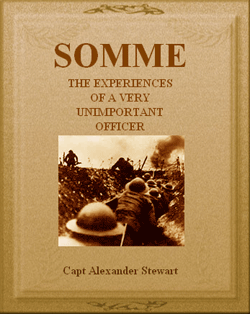LINKS
& RECOMMENDED READING
PUBLISHED IN NOVEMBER 2007
and featured on BBC/Telegraph/Guardian/Daily Mail
Grandfather's Great War - by Captain Alexander Stewart.
This fascinating 260-page diary writtenby a Cameronian Officer who served with the 3rd Battalion in the first World War can be downloaded for £9.95 at www.grandfathersgreatwar.com
 |
"Ninety years ago my grandfather wrote a very personal and graphic account of his time on the Somme in the Great War. He typed three copies and called it 'The Experiences of a Very Unimportant Officer in France and Flanders during 1916 - 1917.' Until now it has only been read by one or two members of my family and close friends. But now, as his grandson, I would like to share this amazing piece of personal history of his time in the trenches as an officer serving with the Scottish regiment - The Cameronians. This account brings to life the reality and horror of what happened to him in those war-torn fields and the loss of life at Mametz Wood.
I hope you will find it equally fascinating."
Jaime Cameron Stewart
|
EXTRACT - Courtesy of Jaime Cameron Stewart:
The mud that claimed lives:
"This part of the line was up to then the worst in which I had been. I refer more particularly to the mud and water. All the land had been very churned up by shell explosions, and for many days the weather had been wet. It was not possible to dig for more than about a foot without coming to water. Mud is a bad description as the soil was more like a thick slime than mud. When walking one sank several inches in and owing to the suction, it was difficult to withdraw the feet. The consequence was that men who were standing still or sitting down got embedded in the slime and were unable to extricate themselves. As the trenches were so shallow men had to stay where they were all day.
Most of the night we had to spend digging and pulling men out of the mud. It was only the legs that got stuck; the body being lighter and larger lay on the surface. To dig a man out the only way was to put duck boards on each side of him and then work at one leg, digging poking, and pulling, until the suction was relieved. Then a strong pull by three or four men would get one leg out and work would be begun on the other.
Back to Battalion Headquarters was about 800 yards. At night it would take a “runner” (i.e. an orderly taking messages) about two hours to get there. Going to and from Battalion Headquarters from the line, one would hear men who had missed their way and got stuck in the mud calling out for help that often could not be sent to them. It would be useless for only one or two men to go to help them, and practically all the troops were in the front line and had, of course, to stay there. All the time the Boche dropped shells promiscuously about the place. He who had a corpse to stand or sit on was lucky."
Further EXCERPTS and DOWNLOADS are available online at: www.grandfathersgreatwar.com
~~~~~~~~~~~~~~~~~~~~~~~~~~~~~~~~~~~~~~~~~
|

